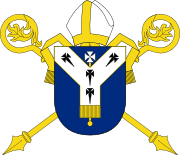| Sources (hover for more info) |
| Civil Registration |
| Census |
| Poor Law Records |
Church Table
Church of England (Anglican Church)
| Jurisdiction | Presiding Official | Types of Records |
| Province | Archbishop | marriage licenses, probates & church court records |
| Diocese | Bishop | bishop's transcripts, marriage licenses, probates & church court records |
| Archdeaconry | Archdeacon | marriage licenses, probates & church court records |
| Rural Deanery | Rural Dean | |
| Parish | Rector or Vicar | parish registers & poor law records |
Notes
- Anciently, there were 2 provinces.
 The Province of York coincided with the 8 northern counties of Cheshire, Cumberland, Durham, Lancashire, Northumberland, Nottingham, Westmoreland, and York. The Archbishop of Canterbury presides over the entire church. Each diocese had 2 or more archdeaconries. The records on the level of the archdeaconry may have been retained separately by the archdeacon or forwarded to the bishop. In the case of the counties of Norfolk and Suffolk there are archdeacon's transcripts.For further information go to Wikipedia: Historical Development of Church of England Dioceses.
The Province of York coincided with the 8 northern counties of Cheshire, Cumberland, Durham, Lancashire, Northumberland, Nottingham, Westmoreland, and York. The Archbishop of Canterbury presides over the entire church. Each diocese had 2 or more archdeaconries. The records on the level of the archdeaconry may have been retained separately by the archdeacon or forwarded to the bishop. In the case of the counties of Norfolk and Suffolk there are archdeacon's transcripts.For further information go to Wikipedia: Historical Development of Church of England Dioceses. - The parish may have contained smaller church units known as chapelries that may have kept records separate from the parish. Certain parishes were exempt from the superior jurisdiction of the rural dean and archdeacon and sometimes the bishop or even the archbishop. Such units were referred to as peculiar parishes. As such, they may also have had marriage licenses, probate records, and church courts on the parish level.
NOTE: You can quickly determine all of the above jurisdictions (except the Archdeaconry) for a given place as of 1851 by going to FamilySearch's England & Wales Jurisdictions 1851 map. See Locations for more details.
- For further details on bishop's transcripts, marriage licenses, poor law records and probate records, see church records, marriage indexes, poor law records, and probate records. For information on church courts, go to this FamilySearch Wiki page on Church Courts in England and Wales. It was adapted from Anthony Camp's article entitled "The English Church Courts and their Records."